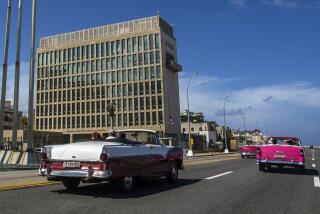U.S. Cites Cuban Bioweapons Effort
- Share via
WASHINGTON — A senior Bush administration official said Monday that U.S. leaders have underestimated the security threat posed by Cuba, and he issued a specific warning about the country’s biological weapons program.
U.S. officials believe that Cuba has “at least a limited offensive biological warfare research and development effort,” said John R. Bolton, undersecretary of State for arms control and international security. And they fear that the Cubans might be passing on their germ weapons know-how to other “rogue” states, he said in a speech at the Heritage Foundation, a conservative public policy center in Washington.
The comments represent a marked toughening of the official line on Cuba. The Castro regime has long been listed by the U.S. government as a state sponsor of terrorism, and officials have said that Cuba was believed to have the capability to produce germ agents. But, until now, government officials have given this danger little emphasis. And they have not indicated that Cuba might be an important source of germ-weapon knowledge for other countries.
The new warnings brought charges from some analysts that the administration was trying to strengthen its political support from anti-Castro Cubans in Florida and other conservatives. Florida is important to President Bush’s reelection prospects, and his brother, Gov. Jeb Bush, is facing an election in November.
Bolton said that the worries about Cuba arise from its “well-developed and sophisticated” biomedical industry, which until 1990 had substantial support from the Soviet Union. The equipment used to manufacture pharmaceutical or agricultural products is considered “dual use,” meaning that it can also be applied to create germ weapon agents, such as viruses and toxins.
Bolton said Cuba “has provided dual-use technology to other rogue states. We are concerned that such technology could support biological warfare programs in those states.”
Bolton did not specify which nations Havana might have aided, but he noted that Cuban President Fidel Castro visited Iran, Syria and Libya last year. Bolton said that Castro told an audience at Tehran University, “Iran and Cuba, in cooperation with each other, can bring America to its knees.”
U.S. officials have underestimated the threat posed by Cuba in large part because of the work of Cuban spies operating in the United States, Bolton declared.
He cited Ana Belen Montes, a longtime Defense Intelligence Agency analyst who pleaded guilty in March to spying for Cuba.
Montes was a contributor to a key 1998 Pentagon report that reviewed Cuba’s military capabilities. The report concluded that the island did not pose a substantial security threat to the United States--though then-Defense Secretary William S. Cohen acknowledged that he was “concerned” about the germ weapons program.
“Why was the 1998 report on Cuba so unbalanced? Why did it underplay the threat Cuba posed to the United States?” Bolton asked. “A major reason is Cuba’s aggressive intelligence operations against the United States.”
There is disagreement over how much proof exists that Cuba is developing a dangerous germ weapons capability.
Stephen Johnson, a specialist on Latin American affairs at Heritage Foundation, said some Cuban migrants have pointed to such dangers.
Johnson said U.S. officials’ suspicions have also been aroused by the fact that Cuba has spent millions on sophisticated biomedical gear, even though it often has shortages of basic medical products.
Some other analysts scoffed at the suggestion that Cuba could be trying to develop such weapons.
Peter Hakim, president of the Inter-American Dialogue, a Washington research center on Latin American affairs, said there has been scant evidence that Cuba was developing such a program.
“This is just nuts,” he said. “If [Bolton] has any evidence for this, he ought to make it public. Otherwise it’s just a smear tactic.”
Julia E. Sweig, deputy director for Latin American studies at the Council on Foreign Relations, a New York-based research center, said the remarks indicate that the Bush administration, under pressure from anti-Castro Cuban Americans to show stronger support for their cause, is looking for a way to make its Cuba policy more distinctive from the Clinton administration’s.
She noted that President Bush is planning an address May 20 in Miami that is expected to make a major statement on Cuba.
“I would read this politically,” she said.
More to Read
Sign up for Essential California
The most important California stories and recommendations in your inbox every morning.
You may occasionally receive promotional content from the Los Angeles Times.














